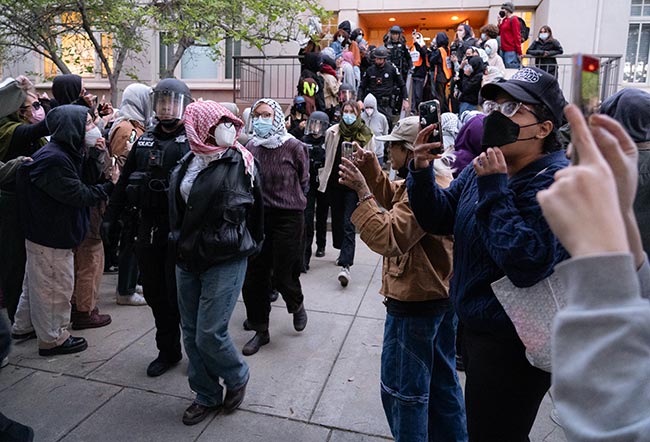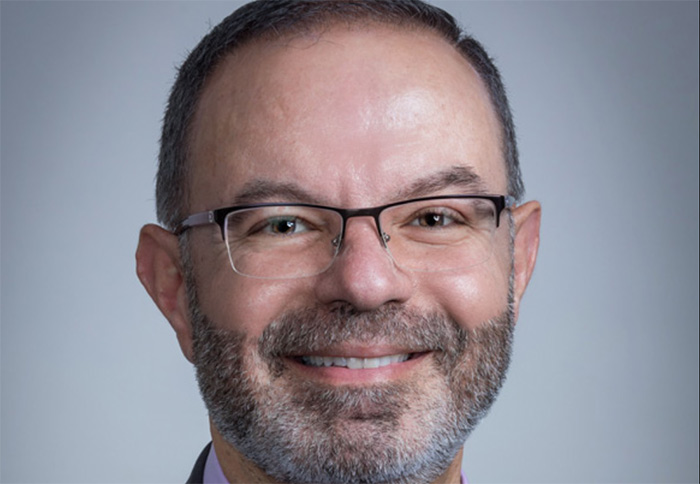New CMC president speaks from heart about success
Hiram E. Chodosh, who was inaugurated as the fifth president of Claremont McKenna on Saturday, has some distinct goals as he takes the reins of the prestigious liberal arts college.
The first of these is to moderate the cost of a CMC education by marshaling more means to aid students and their families. He considers it equally important to ensure that every possible resource is shepherded to meet students’ needs “in an extraordinary way.”
“We need to be engaged in thinking about value in terms of the capabilities students will carry out with them, to ensure that their capacities are well-aligned with what the world values,” he said.
It’s a challenge to keep up with the demands of the global marketplace, and to predict what will be needed next.
“You have to ask a lot of questions and think critically about the answers, making sure they are not ephemeral. You have to make educated guesses about long-term trends,” he explained. “Yogi Berra said, ‘The future isn’t what is used to be.’ You have to use caution when making guesses about the future.”
Luckily, there are constants when it comes to the characteristics that will generate success, regardless of time or trend, Mr. Chodosh said. People will always be sought-after if they are imaginative, analytically critical and ethical; if they communicate with and work well with others; and if they are able to get out of their comfort levels and absorb lessons from dealing with others.
“Science, computer science and quantitative skills, as well as sophistication with technology, are increasingly important. But they can’t be pursued in isolation from the deepest questions of society,” Mr. Chodosh cautioned.
“Sometimes people say humanities are important for their own sake,” he continued. “It’s important in addition to note that humanities also have enormous instrumental value to making decisions on almost every important policy and dilemma in the world—questions about the value of human life, about how to pursue a good end through good means. These often can’t be answered alone through a quantitative method.”
Mr. Chodosh, who assumed his presidency on July 1, comes to the college after a seven-year tenure at the University of Utah. There, he served as dean of the SJ Quinney College of Law as well as the Hugh B. Brown Endowed Presidential Professor of Law and Senior Presidential Adviser on Global Strategy. Prior to that, Mr. Chodosh was a professor and administrator for 13 years at Case Western Reserve University School of Law in Cleveland, Ohio and before that, he practiced law. He earned his bachelor’s degree in history from Wesleyan University and his Juris Doctor degree from Yale Law School.
Mr. Chodosh’s achievements are myriad but, in his inaugural speech, he insisted he can’t take credit for his accomplishments. Instead, he attributes his success to the many people who have inspired him over the years. Not least among these is his grandmother, who at 18 fled the persecution of Jews in her native land, traveling via steerage class from her small village near Odessa in the Ukraine to New York’s Ellis Island.
Along with imparting love over milk, chocolate Hershey Kisses and games of canasta and gin rummy, Mr. Chodosh’s grandmother passed on stories that impressed him with the importance of family, freedom and strength in the face of adversity.
Mr. Chodosh told the gathered crowd of the time when, to mark his 13th birthday, his grandmother sat down with him and his mother for a quiet, personal sort of bar mitzvah. Over Lipton tea and Entenmann’s cake, she told him he was named after her husband, who died before he was born. She then presented him with a rumpled envelope containing a number of five- and ten-dollar bills that she had amassed over years of savings.
“My Nana didn’t have much money or formal education, and yet she taught me a grand lesson that day,” he related. “Just feeling fortunate, being free, having the support of my family, getting an education, these things were no longer enough.
“Suddenly I was a young man accountable, responsible for carrying the namesake of the man she loved and missed so much,” he continued. “Responsible for doing good in the world, for sharing that sense of fortune, freedom and family—for sharing all I could learn with others. So today, I draw on the parallel lesson of that quiet gathering of three in today’s spirited gathering of hundreds. Today, I cross the stage and I take responsibility.”
As he does so, Mr. Chodosh is committed to fostering an atmosphere that inspires Claremont McKenna students to take responsibility, to take action informed by knowledge, something he feels is at the heart of a liberal arts education. One of the hallmarks of a Claremont McKenna education, more specifically, is a tradition of academic innovations that he vows to continue.
One such innovation is bringing departments together on major issues in the development of students and society. CMC demonstrated this sort of convergence with a series of public sessions, themed The Art and Science of Decision-Making, held the day before Mr. Chodosh’s installation ceremony. The presentations explored “how a liberal arts education harnesses many academic disciplines to help students develop a richer understanding of decision-making.”
Mr. Chodosh would rather spend time championing the importance of a liberal arts education and getting down to the business of helping CMC maintain its longstanding excellence. Nonetheless, he took a moment to address how the school is repairing its image in the wake of a scandal that came to light in 2012, in which a senior administrator admitted that he had for six years inflated the SAT scores of incoming freshmen in order to advance the institution’s national rankings.
“I don’t think there’s anything left to repair,” Mr. Chodosh said simply. “The school responded immediately and transparently. It [initiated] an independent investigation and improved and intensified a whole series of data integrity measures internally. I think the response was exemplary.”
More interesting to Mr. Chodosh is the power of the Claremont Colleges Consortium, an association that joins the resources of the town’s five undergraduate institutions and two graduate universities: Pomona, Scripps, Harvey Mudd, Claremont McKenna and Pitzer Colleges as well as the Claremont Graduate University and the Keck Graduate University.
“There’s nothing like it in higher education,” Mr. Chodosh said. “This country has consortia of colleges, but none as concentrated, proximate and extraordinarily successful. There’s no hierarchal arrangement above The Colleges.
“This set-up requires a special commitment to collaboration, a very generous spirit of sharing what each of us has to offer to the others,” he continued. “It’s the most unique experiment in comparative advantage in US education.”
—Sarah Torribio
storribio@claremont-courier.com
.








0 Comments